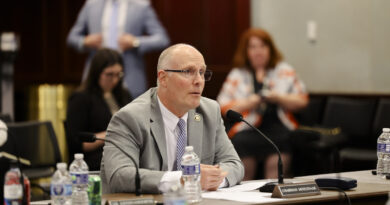Trump Indicates Willingness for Multiple Budget Bills Following Initial Support for a Single Bill Strategy
Previously, Trump expressed a desire for a “one, big, beautiful bill,” but on February 21, he indicated he would be open to multiple bills if needed.
The House is scheduled to vote on its budget plan next week.
Republicans in both the Senate and House, maintaining narrow majorities, are aiming to authorize nearly $5 trillion in new expenditure to fulfill Trump’s campaign commitments—from constructing a wall on the U.S.-Mexico border to extending tax reductions introduced in the Tax Cuts and Jobs Act of 2017.
On February 21, Trump conveyed that he was indifferent to the number of reconciliation bills that could be utilized for this funding, which has caused notable conflict between the two chambers for several weeks.
“You could do three. You could do 10. As long as we get along … as long as we get them all added up and it’s the same thing,” Trump remarked during an interview on The Brian Kilmeade Show on Fox News Radio. “It gives you optionality.”
The Senate Republican Conference is working to pass two reconciliation bills: one that allocates funding for border security and military expenses, and another that is focused on extending tax cuts and raising the sovereign debt ceiling.
The cost to fund the extension of the Tax Cuts and Jobs Act of 2017 tax cuts, estimated to reach up to $4.5 trillion, is causing divisions within the Senate Republican Conference due to potential cuts to Medicaid, the healthcare program for low-income individuals. Many senators oppose reductions to Medicaid funding.
In contrast, the House Republican Conference is aiming to advance only one reconciliation bill, driven by internal disagreements among members. The group includes a sizable contingent of fiscal conservatives against any new spending that lacks substantial cuts. House Speaker Mike Johnson (R-La.) has consistently stated that his conference can realistically only support a single bill because of the delicate nature of their consensus.
After Trump initially backed the House’s strategy, the Senate clarified that its plan serves as a reserve option in the event that the House’s budget resolution fails to pass. With a single-seat majority, the House Republicans could face a dire situation if even two members defect amidst united Democratic opposition.
Trump commented that it was a “very good signal” when the Senate passed its initial budget blueprint on Friday, asserting that Republicans demonstrate “great unity.” All but one Republican, Sen. Rand Paul (R-Ky.), supported the measure, while every Democrat voted against it.





